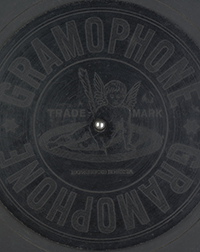
The Irving S. Gilmore Music Library is pleased to announce the completion of a project to describe and provide free open access to a collection of 732 Berliner Gramophone discs from its Historical Sound Recordings (HSR) Collection. In the late 19th Century, Emil Berliner (1851-1929) developed the gramophone, which employed flat disc instead of cylinder based recording technology. Cylinders and discs co-existed for a few years, but eventually Berliner's discs won out and became the dominant technology. The discs in this collection, produced between 1887-1912, represent some of the very first published disc recordings, and offer a unique insight into the earliest years of music and spoken word recording. The recordings are open access, and therefore available to stream by anyone, anywhere, anytime. Access to the collection is available through Archives at Yale.
Availability of this important collection was made possible thanks to a grant to Yale University Library from the Arcadia Fund to support open access initiatives. This fund enabled the music library to further develop its new audiovisual access platform, Aviary. The music library has now added over 2000 recordings to Aviary, providing streaming access to important collections from HSR and Oral History of American Music (OHAM).
In addition to the recently added Berliner Gramophone discs, the music library has also recently made a collection of 288 test pressings in the Robert Shaw Papers available to stream. These test pressings, produced between 1938-1953, consist primarily of recordings of the Robert Shaw Chorale, with special emphasis on the ensemble's performances of English and American songs such as "America the Beautiful" and "Oklahoma." The test pressings also document some of Shaw's work with the Collegiate Chorale and the RCA Victor and NBC Symphony Orchestras, including performances of the B Minor Mass of Johann Sebastian Bach and the Requiems of Luigi Cherubini and Johannes Brahms. These recordings are available to openly available stream when connected to the Yale network. Patrons outside of Yale can create a free account to then request 30 days free streaming access to any recording in the collection.
Details of other collections now available to stream, can be found in this news post from September 2019.